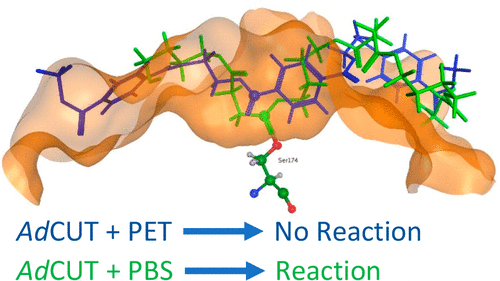Konstantinos, a fourth year SoCoBio DTP student, is happy to share his contribution in the publication in ACS Omega “Understanding the Catalytic Efficiency of Two Polyester Degrading Enzymes: An Experimental and Theoretical Investigation”.
Polyester degrading hydrolases are enzymes that are able to degrade plastic polymers such as polyethylene terephthalate (PET), polybutylene succinate (PBS) and others. Despite their high-sequence similarity, polyester degrading hydrolases have significantly different specificities towards which type of plastic polymer they can degrade. This paper describes the combined use of biochemical experiments and computational analysis to display the specificity differences between two enzymes, Acidovorax delafieldii cutinase (AdCut) and Ideonella sakaiensis PET hydrolase (IsPETase).
Konstantinos’ contribution to this paper was work on computational modelling of bis(2-Hydroxyethyl) terephthalate (BHET) binding in IsPETase and AdCut, using protein docking. BHET is a PET degradation product, which can further be degraded by IsPETase but not AdCut. The results indicated an unfavourable placement of BHET in AdCut, where the distances between the atoms of the protein and BHET were significantly larger compared to the placement of BHET in IsPETase.
In summary, this research identified the cause of the poor degradation capability of AdCut against BHET, compared to IsPETase, as how computationally modelling can assist biochemical analysis.
For further reading this research is published by ACS Omega. (https://pubs.acs.org/doi/10.1021/acsomega.4c06528), (DOI:https://doi.org/10.1021/acsomega.4c06528).”

